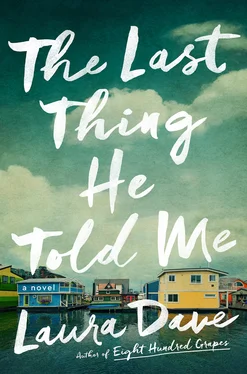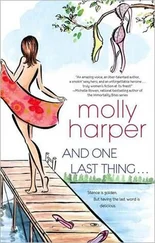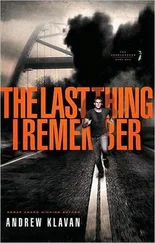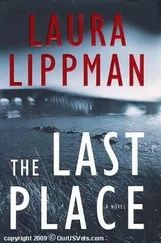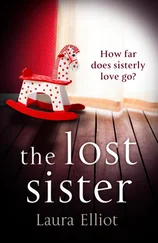Charlie pulls me into the kitchen, the door swinging closed behind us.
“Do you know how many cops have come in here tonight? They’re not asking me anything yet, but they’re coming in so I can see them. So I’ll know they’re here. They’re all over the place.”
“I don’t think they’re cops,” I say. “I think they’re U.S. marshals.”
“Do you think this is funny?” he says.
“None of it,” I say.
Then I meet his eyes.
“You had to tell him we were here, Charlie,” I say. “He’s your father. She’s your niece. You’ve both been looking for her since the day he took her away. You couldn’t keep that to yourself, even if you wanted to.”
Charlie pushes open the emergency door, which leads to a back staircase and the alley below.
“You need to leave,” he says.
“I can’t do that,” I say.
“Why not?”
I shrug. “I have nowhere else to go.”
It’s true. In a way I’m uncomfortable acknowledging to myself—let alone to him—Charlie is the only shot I have left to make this okay again.
Maybe he senses that because he pauses, and I see him falter in his resolve. He lets the emergency door close.
“I need to talk to your father,” I say. “And I’m asking my husband’s friend to help make that happen.”
“I’m not his friend.”
“I don’t think that’s true,” I say. “I had my friend Jules find Ethan’s will for me.” Ethan, using that name. “His real will. And he put you in it. He put you in it as a guardian for Bailey, along with me. He wanted her to have you if anything ever happened to him. He wanted her to have me and he wanted her to have you.”
He nods slowly, taking this in, and for a second I think he is going to start crying. His eyes water, his hands move to his forehead, pulling on his eyebrows, as if trying to stop the tears. These tears of relief that there is a window open to his seeing his niece again—and tears of utter sadness that seeing her for the last decade has been an impossibility.
“And what about my father?” he says.
“I don’t think he wants her to have anything to do with Nicholas,” I say. “But the fact that Ethan put you in there lets me know that my husband trusted you, even if you seem pretty conflicted about that.”
He shakes his head, like he can’t believe this is his reality. It’s a feeling I can relate to.
“This is an old battle,” he says. “And Ethan isn’t innocent. You think he is. But you don’t know the whole story.”
“I know I don’t.”
“So what do you think? That you’re going to talk to my father and broker some peace between him and Ethan? It doesn’t matter, nothing you say matters. Ethan betrayed my father. He destroyed his life and ended my mother’s life in the process. And if there’s nothing I can do to mend this, then there’s nothing you can do either.”
Charlie is struggling. I see it. I see him struggling with what to tell me about his father, what to tell me about Owen. If he offers up too little, I won’t walk away from him. Maybe I won’t walk away if he says too much either. And he wants me to walk away. He thinks it’s better for everybody if I do. But I am playing past that. Because I know there is only one way to make things better now.
“How long have you been married to him?” he says. “To Ethan?”
“Why does that matter?”
“He’s not who you think he is.”
“So I keep hearing,” I say.
“What has Ethan told you?” he says. “About my sister?”
Nothing, I want to say. Nothing I know to be true. She doesn’t, after all, have fierce red hair or love science. She didn’t go to college in New Jersey. She may very well not know how to swim across a pool. I know now why he told us all those things—why he made up such an elaborate backstory. It was so, on the off chance the wrong person ever approached Bailey, if the wrong person ever suspected Bailey of being who she actually was, she’d be able to look that person in the eye and honestly deny it. My mother is a redheaded swimmer. My mother is nothing like the person you think I belong to.
I meet Charlie’s eyes, answer honestly. “He hasn’t told me much. But he once told me how much I would have liked her,” I say. “He told me we would have liked each other.”
Charlie nods, but he stays quiet. And I can feel all the questions he has about my life with Owen, all the questions about Bailey: about who she is now and what she likes now and how she may still be a little like his lost sister, who he clearly loved. But he can’t ask any of those questions, not without fielding questions of his own, questions for which he doesn’t want to provide answers.
“Look,” he says, “if you want someone to tell you that there’s enough goodwill because of Kristin that my father can get over what happened between him and Ethan, that they can reach some kind of truth, they can’t. He won’t. It doesn’t work like that. My father isn’t over it.”
“I know that too,” I say.
And I do know that. But I’m banking on the fact that Charlie wants to help me anyway. Or we wouldn’t be having this conversation. We’d be having a different conversation—a conversation neither of us wants to have about what Owen has done to this family. And to me. We’d be having a conversation that would break my heart wide open.
He looks at me more gently. “Did I scare you earlier?” he says.
“I should be asking you that.”
“I didn’t mean to come at you the way I did. It was just that you surprised the hell out of me,” he says. “You wouldn’t believe how many people come here, stirring up trouble for my father. All these crime junkies who saw the trial coverage on Court TV, who think they know my father, who want autographs. Even all these years later. I think we’re on some criminal enterprise tour of Austin. Us and the Newton Gang…”
“That sounds awful,” I say.
“It is,” he says. “It’s all awful.”
Charlie looks at me, taking me in. “I don’t think you know what you’re doing. I think you’re still hoping for a happy ending. But this story doesn’t end well,” he says. “It can’t.”
“I know it can’t. I’m just hoping for something else.”
“What’s that?”
I pause. “That it doesn’t end here.”
On the Lake
Charlie drives.
We head northwest of the city past Mount Bonnell and into Texas Hill Country. Suddenly I’m surrounded by rolling hills, trees and foliage everywhere, the lake muted outside the car windows, tepid. Unmoving.
The rain abates as we turn down Ranch Road. Charlie doesn’t say much, but he tells me that his parents bought their Mediterranean estate nestled on the shores of the lake a couple of years ago—the year Nicholas got out of prison, the year before his mother died. This was his mother’s dream house, he says, this private retreat, but Nicholas has stayed there since her death, on his own. I learn later that it cost them a cool ten million dollars—this estate which, as I see on a plaque at the foot of the driveway, Charlie’s mother, Meredith, named THE SANCTUARY.
It is easy to see why she has chosen this name. The estate is enormous, wildly beautiful, and private. Entirely private.
Charlie enters a code and the metal gates open to reveal a cobblestone driveway, at least a quarter of a mile long, that slowly winds its way to a small guardhouse. The guardhouse is covered in vines, making it inconspicuous.
The main house is less inconspicuous. It looks like it belongs on the French Riviera—complete with cascading balconies, an antique-tile roof, a stone facade. Most notable are the gorgeous bay windows running at least eight feet tall, welcoming you, inviting you in.
Читать дальше
